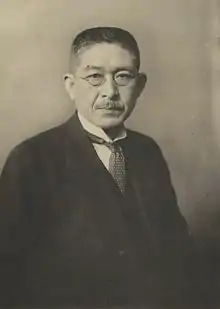Hajime Seki
Hajime Seki (關 一, Seki Hajime, September 26, 1873—January 26, 1935) was the mayor of Osaka, Japan between 1923 and 1935.

Early life
Hajime Seki was born on the Izu Peninsula in Shizuoka on September 26, 1873.[1] He graduated from Hitotsubashi University (then Koto Shogyo Gakko) in 1893, and served at the Ministry of Finance until becoming a professor at his alma mater in 1897. The next year, he left for Europe, where he spent three years studying in Belgium. In 1910, he obtained the title of Doctor of Juridical Science.
Mayor of Osaka
He became the deputy mayor of Osaka in 1914 before serving as the mayor for over eleven years from 1923 to 1935. While he was mayor, he was instrumental in both the development of social capital such as the construction of ports and railways, and the implementation of urban social policy including the establishment of public markets, construction of city-provided housing as well as the establishment of the Osaka University of Commerce.[2]
He is most well known today, however, for widening the Midosuji Boulevard, an avenue that stretches through the heart of Osaka.[3] He was also responsible for the construction of the subway that runs below Midosuji Boulevard.
Hajime Seki died of Typhus on January 26, 1935, one year after being selected as a member of the House of Peers in 1934. He was 61.
External links
References
- "Seki, Hajime". www.ndl.go.jp. Retrieved 2016-12-06.
- "Seki, Hajime". www.ndl.go.jp. Retrieved 2016-12-06.
- Hein, Carola (2003-05-01). "The City as Subject: Seki Hajime and the Reinvention of Modern Osaka. By HanesJeffrey E.. Berkeley and Los Angeles: University of California Press, 2002. xii, 348 pp. $45.00 (cloth)". The Journal of Asian Studies. 62 (2): 614–615. doi:10.2307/3096284. ISSN 1752-0401.